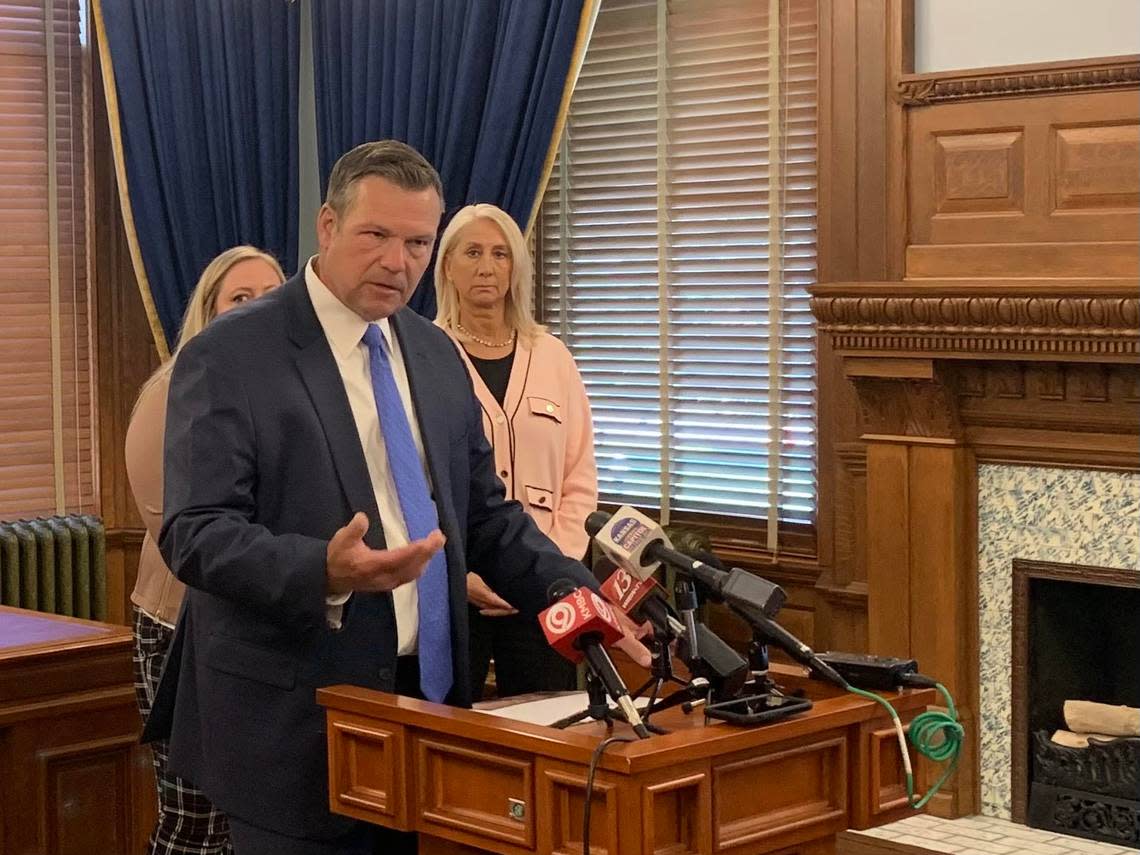Kobach argues trans Kansans shouldn’t change gender on driver’s licenses during lawsuit

- Oops!Something went wrong.Please try again later.
Kansas Attorney General Kris Kobach on Wednesday told a Shawnee County judge that transgender residents should be blocked from changing the gender listed on their driver’s licenses as a legal challenge to a new state law defining man and woman plays out in court.
The Republican state attorney general said testimony from trans Kansans, who were expected to take the stand this week, was likely irrelevant.
Kobach’s arguments came in the latest hearing over the impact of a bill the GOP-controlled Kansas Legislature approved last year defining man and woman in state law based upon sex assigned at birth. The law, called SB 180, was one of several approved by legislators last year that regulate the lives of trans residents.
At the Shawnee County District Court hearing, Kobach, the Kansas Department of Revenue, and the ACLU of Kansas argued over whether KDOR should be blocked from allowing gender marker changes while the lawsuit against SB 180 continues.
The court hearing came as lawmakers returned this week to Topeka for the 2024 legislative session. Lawmakers have shown little interest in returning to the definition of man and woman, but have indicated plans to pursue limits on hormone therapy and gender-affirming surgery for trans minors.
Kobach sued the Kansas Department of Revenue this summer after the agency announced it would continue allowing gender marker changes despite SB 180. The agency contended state law requires driver’s licenses to reflect the gender of its owner, not the sex.
KDOR is currently barred from changing licenses following an emergency order issued by Shawnee County District Court Judge Theresa Watson over the summer.
The results of this week’s hearing, scheduled for Wednesday and Thursday, will determine legal options for trans residents to change documentation as the lawsuit works its way through the court system.
During the hearing, Kobach referenced a federal court decision in September blocking the state from changing sex markers on birth certificates. While the Shawnee County court is not bound by the federal court decision, Kobach said, it created uniformity in state policy.
“The objective of 180 is to stop things from changing from one agency to another,” Kobach said. “That uniformity should not be interrupted.”
But Ted Smith, an attorney for the Kansas Department of Revenue, said in opening arguments that the agency relies on a variety of documents to confirm gender and that Kobach’s interpretation of a broad statute should not override specific language directing the agency to prepare licenses based on gender.
The question, Smith said, is whether a driver’s license is a historical document or “something representative of an individual and how they present themselves to society.”
This week’s hearing will include testimony from Kansas police officers on how gender markers affect their work as well as trans Kansans who say they would be harmed by an ability to change the gender marker on their drivers licenses.
In opening arguments Kobach said he didn’t believe the testimony of the trans residents would be relevant to the case because they were third-party intervenors, not the defendants, and because many of the intervenors had already changed the gender marker on their licenses.
Sharon Brett, legal director of the ACLU of Kansas, argued that the inability to maintain those licenses would force transgender residents to unwillingly reveal their transgender identity every time they showed their drivers licenses.
This, she said “will put intervenors and others like them at risk for discrimination, harassment and worse.”
While Brett said Kobach’s interpretation of state law was incorrect, she also argued the new law itself was unconstitutional. The ACLU has referenced the 2019 Kansas Supreme Court ruling that found a state right to an abortion while arguing state law infringes upon transgender Kansans’ fundamental right to bodily autonomy.

